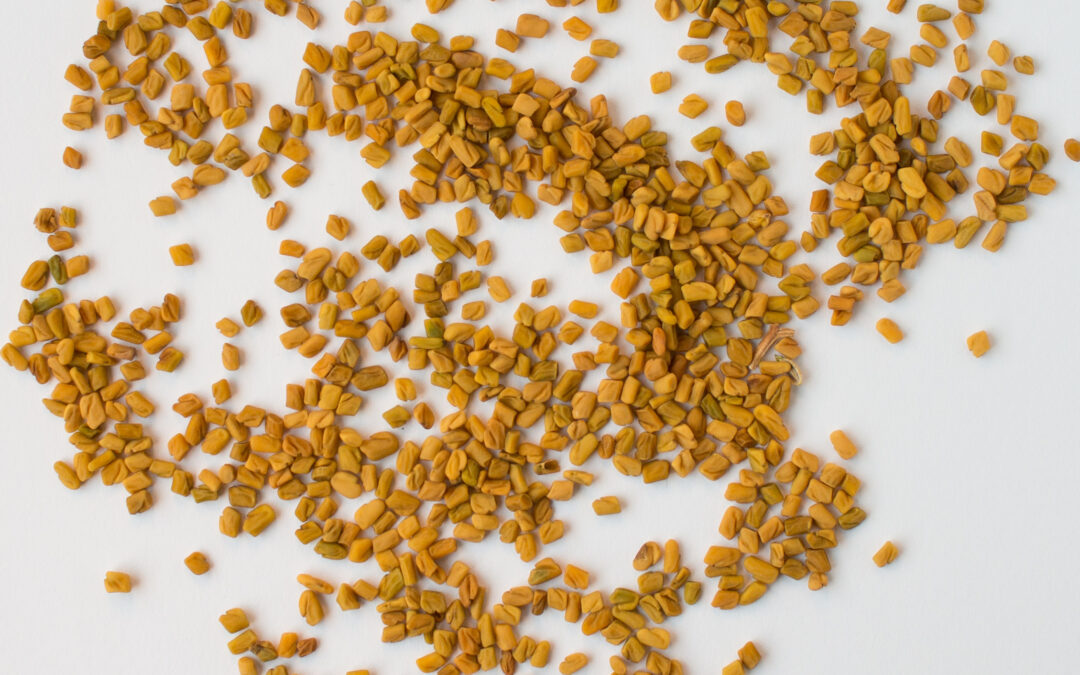This incredibly beneficial herb has been used for thousands of years to help in digestion, milk production, and even sexual health. It aids in alleviating congestion and moves mucus down and out of the body, thus benefiting in inflammation. Fenugreek is frequently overlooked by some doctors due to the small amount of clinical studies done on the herb, however ayurvedic practitioners and complimentary doctors alike widely use this herb for its numerous health benefits.
Fenugreek is native to the meditteranean region, southern europe, and western asia. It is widely known for its sweet smell and taste which is similar to maple syrup. Fenugreek seeds help pacify Kapha and Vata, but increase Pitta because it is a warming herb. Its most common use in Ayurveda is to increase milk supply in women, and aid in menstrual symptoms. This is due to the fact that fenugreek’s bitter, pungent and sweet tastes help to move Vata downward. This movement can alleviate menstrual cramps, but also helps with gas and bloating. Fenugreek increases the digestive fire (agni) which is extremely beneficial to overall blood health, making for a healthier flow in all aspects.
The most common way to include more fenugreek into your diet is to use it in your food. Saute it with ghee and add it to any dish you like, or you can brew it as a tea. This is a really great way of moving any excess mucous down and out of the body. Just add a teaspoon of the seeds to hot water and let it steep for 5-10 minutes. Another common way of taking fenugreek is to soak the seeds in water overnight, about a tablespoon or two, then eating them in the morning. Fenugreek is also commonly used as a poultice. You can grind up the seeds into a powder and mix with water to apply to the skin or use it as a bath soak. Externally, this alleviates excess Pitta.
The grounding element of this herb is what makes it great for reproductive health too! An interesting effect of fenugreek is that it promotes healthy libido. Due to the downward movement of the fenugreek, it promotes healthy blood flow to the lower back and pelvis, allowing for more energy, strength, well-being, and sexual stamina. It is beneficial for both men and women.
Like all supplements, it is important to understand that all herbs should be taken after you have talked to your health care professional. Some side effects of using too much fenugreek include gastro-intestinal discomfort, diarrhea, and a harmful drop in blood pressure. Some people have also reported that it can cause an odor in your urine and sweat, making you smell a bit like maple syrup. It is safest to use it in your food, and you should consult with your Ayurvedic doctor before taking supplemental pills of fenugreek. Although it can cause a drop in blood sugar, there are significant studies showing the benefits of fenugreek on pre diabetes and hyperglycemia.
The overall benefits of fenugreek on the body are nourishing, grounding, and calming. It is a great staple to keep in your kitchen to experiment with. If you have any questions about fenugreek and using it in recipes, please reach out to us and we would be more than happy to give you more information!
Resources:
Fenugreek, NCCIH
Effect of fenugreek on hyperglycemia and hyperlipidemia in diabetes and prediabetes: a meta-analysis. Journal of Ethnopharmacology.
Dietary supplements for dysmenorrhea. Cochrane Database of Systematic Reviews
8.12.2021
